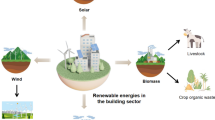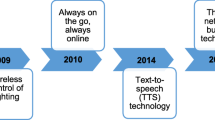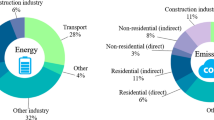Abstract
Buildings account for over 30% of the world’s energy consumption and are therefore a key contributor to a country’s energy as well as carbon budget. Understanding how buildings use energy is critical to understanding how any new policy may impact a building’s energy use. Data enables decision-making, and good quality data arms consumers with tools to compare their energy performance relative to their peers. This allows them to differentiate their buildings in the real estate market on the basis of their energy footprint. Good quality data are also essential for policy makers to prioritize their strategies as well as track implementation and impact. Several countries have effective efficiency programs in the buildings sector that are developed on the basis of good quality data. However, lack of consistent and comprehensive data on commercial building energy end-use and energy using equipment stock in India’s case continues to impede effective tracking of building energy consumption as well as performance. In this paper we review the experience of countries across the world with different approaches and systems to collect building energy data, some of whom maintain it on a regular basis. Utilizing others’ experience, we explore potential use cases and approaches for establishing a comprehensive building energy data framework for India.


Similar content being viewed by others
Notes
Since the service sector in India comprises mainly business services, real estate, construction, institutions, hotels, restaurants, and other services, it is a significant indicator of the growth of the buildings sector.
including detailed data on ownership and activity (building occupancy type/ activity type/ green mark labelling), building data (gross floor area, carpark area, number of rooms, major retrofitting), building services information (lifts/ ACMV/ lighting/ hot water systems/ building electricity and other fuels consumption.
Three stakeholder consultations were held as part of a Roundtable on Commercial Building Energy Data Framework, in New Delhi, India (December 2015, February, and August 2016).
As per footnote 2
References
Ackoff, R. L. (1971) Towards a system of systems concepts. Management Science: Vol. 17, No. 11.
Acripowska, A., Rapf, O., Faber, M., Fabbri, M., Tigchelaar, C., Boermans, T., Surmeli-Anac, N., Pollier, K., Dal, F., Sebi, C., and Karasek, J. (2014). Support for setting up an observatory of the building stock and related policies.
Arcipowska, A. and Mariottini, F. (2016). Role of the EU Buildings stock observatory in evaluation of the buildings policies. 2016 International Energy Policies& Programmes Evaluation Conference At: Amsterdam (The Netherlands).
ASHRAE. (2015). Standard, 100 https://www.ashrae.org/technical-resources/bookstore/standard-100.
BESS (2019). BCA Building Energy Benchmarking Report. https://www.bca.gov.sg/BESS/BenchmarkingReport/BenchmarkingReport.aspx. Accessed Dec 2019.
BESS. (2014) Building energy submission system. https://www.bca.gov.sg/bess/. Last accessed in June 2016
Borgstein, E. H., Lamberts, R., & Hensen, J. L. M. (2016). Evaluating energy performance in non-domestic buildings: A review. Energy and Buildings, 128(2016), 734–755.
BPIE (2020) Building Data and Tools. https://www.bpie.eu/knowledge-hub/#ongoing-projects
BuildingSync (2015) https://buildingsync.net/ Last accessed in June 2016.
Bureau of Energy Efficiency. (BEE) (2016). “Energy benchmarks for Commercial Buildings.” https://www.beeindia.gov.in/sites/default/files/Flyer_22nd%20Jan.pdf
CBERD (2015). Raza, Md Asif, Yash Shukla, Paul Mathew, and Reshma Singh. "Graduated energy benchmarking for hotels: A comparative analysis of three approaches." CBERD Technical Report. CEPT University. Lawrence Berkeley National Laboratory. April. 2015
CEC (2019). Building energy benchmarking program. https://www.energy.ca.gov/benchmarking/ Last accessed in September 2020.
Central Electricity Authority. (2017). Growth of electricity sector in India from (pp. 1947–2017). CEA. GOI.
D’Agostino, D., Cuniberti, B., & Bertoldi, P. (2017). Energy consumption and efficiency technology measures in European non-residential buildings. Energy and Buildings, 153(2017), 72–86.
Decisions, S. (2008). Situation analysis of commercial buildings in India. Report to the Bureau of Energy Efficiency. Ministry of Power.
ENTRANZE. (2012–2014) Policies to enforce the transition to nearly zero energy buildings in the EU-27. https://www.entranze.eu/tools/interactive-data-tool. Last accessed in September 2020.
EU BSO (2016) https://ec.europa.eu/energy/topics/energy-efficiency/energy-efficient-buildings/eu-bso_en.
Evans, M., Jin, L., Halverson, M., Tan, Q. and Yu, S. (2017). Building energy code toolkit.
GBPN (2013). Robust building data: A driver for policy development. Technical Report.
GOI (2016). Citizen’s charter for MOSPI.
GOI (2019). Economic Survey 2017-18. http://indiabudget.nic.in/vol2_survey.asp.
GOI: BEE (2017). https://beeindia.gov.in/sites/default/files/tender_document/BEE_ECBC%202017.pdf Last accessed in June 2019.
GOI: MOP (2001). http://powermin.nic.in/sites/default/files/uploads/ecact2001.pdf. Last accessed in June 2019.
GOI: MOP. (2016a) http://powermin.nic.in/en/content/energy-efficiency. Last accessed in September 2019.
GOI: MOP (2016-b). Standards and Labeling Programme. https://beeindia.gov.in/content/standards-labeling. Last accessed in June 2020.
GOI:MOP (2018). http://www.econiwas.com/pdf/publication/ECBC_BOOK_Web.pdf. Last accessed in September 2020.
Green Building XML. (2013) http://www.gbxml.org/index.html. Last accessed in September 2019.
Harvey, L. D. D., Korytarova, K., Lucon, O., & Roshchanka, V. (2014). Construction of a global disaggregated dataset of building energy use and floor area in 2010. Energy and Buildings, 76(2014), 488–496.
High performance commercial buildings in India (HPCB). (2012). http://high-performancebuildings.org/. Last accesse in September 2019.
IEA Annex 70. (2016). Building energy epidemiology: Analysis of real building energy use at scale. Last accessed in June 2020.
IEE Project EPISCOPE. (2013–2016) Energy performance indicator tracking schemes for the continuous optimisation of refurbishment processes in European housing stocks. https://episcope.eu/iee-project/episcope/ Last accessed in June 2019.
IEE Project TABULA. (2009–2012). Typology approach for building stock energy assessment. https://episcope.eu/iee-project/tabula/ Last accessed in June 2019.
Itron. (2006) California commercial end-use survey. Prepared for: California Energy Commission. March 2006. http://web.archive.org/web/20190112033409/https://www.energy.ca.gov/2006publications/CEC-400-2006-005/CEC-400-2006-005.PDF. Last accessed in September 2020.
Iyer, M. and Sathaye, J. (2012). Market assessment of public sector energy efficiency potential in India. https://ies.lbl.gov/publications/market-assessment-public-sector.
Iyer, M., Kumar, S., Mathew, S., Stratton, H., Mathew, P., and Singh, M. (2016). Establishing a commercial buildings energy data framework for India: A comprehensive look at data collection approaches, use cases and institutions. LBNL-1006427.
Kristic, H., and Teni, M. (2017). Review methods for buildings energy performance modelling.
Kumar, S., et al. (2010a). Performance based rating and energy performance benchmarking for commercial buildings in India, BauSIM 2010. Vienna University of Technology.
Kumar, S., Kapoor, R., Rawal, R., Seth, S., & Walia, A. (2010b). Developing an energy conservation building code implementation strategy in India. In Proceedings of the ACEEE 2012 Summer Study on Energy Efficiency in Buildings (Vol. 8, pp. 209–224). American Council for an Energy Efficient Economy.
Kumar, S., Sarraf, S., Seth, S., Kamath, M., Pandita, S., Deshmukh, A., & Walia, A. (2010c). Performance based rating and energy energy performance benchmarking for commercial buildings in India. In Paper presented at BAUSIM 2010. Austria.
Kumar, S., Yadav, N., Singh, M., & Kachhawa, S. (2019). Estimating India’s commercial building stock to address the energy data challenge. Building Research and Information, 47(1), 24–37. https://doi.org/10.1080/09613218.2018.1515304.
LBNL, Claudine Y. Custodio, Walter, T., Dunn, L., Mercado, A., Brown, R.E. and Mathew, P. (2015). Data preparation process for the buildings performance database.
Lucon O., Ürge-Vorsatz, D., Zain Ahmed, A., Akbari, H., Bertoldi, P., Cabeza, L.F., Eyre, N., Gadgil, A., Harvey, L.D.D., Jiang, Y., Liphoto, E., Mirasgedis, S., Murakami, S., Parikh, J., Pyke, C. and Vilariño, M.V. (2014): Buildings. In: Climate Change 2014: Mitigation of Climate Change. Contribution of Working Group III to the Fifth Assessment Report of the Intergovernmental Panel on Climate Change [Edenhofer, O., Pichs-Madruga, R., Sokona, Y., Farahani, E., Kadner, S., Seyboth, K., Adler, A., Baum, I., Brunner, S., Eickemeier, P., Kriemann, B., Savolainen, J., Schlömer, S., von Stechow, C., Zwickel T., and Minx, J.C. (eds.)]. Cambridge University Press, Cambridge, United Kingdom and New York, NY, USA.
McNeil, M., Letschert, V., Rue du Can, S., & Ke, J. (2013). Bottom-up energy analysis system (BUENAS) – An international appliance efficiency policy tool. Energy Efficiency, 6, 617. https://doi.org/10.1007/s12053-013-9213-y.
MOSPI (2015). National accounts statistics, several issues.
MOSPI. (2018). Energy Statistics 2018. MOSPI, GOI.
National Energy Efficiency Data-Framework (NEED). (2015) https://www.gov.uk/government/statistical-data-sets/national-energy-efficiency-data-framework-need-data-explorer. Last accessed in September 2016.
National Research Council (2012). Effective tracking of building energy use: Improving the commercial buildings and residential energy consumption surveys.
Nikolaou, T., Kolokotsa, D., & Stavrakakis, G. (2011). Review on methodologies for energy benchmarking, rating and classification of buildings. Advances in Building Energy Research, 5(1), 53–70. https://doi.org/10.1080/17512549.2011.582340.
ODYSSEE-MURE. (2013–2016-a) MURE (Mesures d'Utilisation Rationnelle de l'Energie) Project. https://www.measures.odyssee-mure.eu/ Last accessed in June 2020.
ODYSSEE-MURE. (2013–2016-b) ODYSSEE Project. https://www.indicators.odyssee-mure.eu/ Last accessed in June 2020.
Pérez-Lombard, L., Ortiz, J., González, R., & Maestre, I. R. (2009). A review of benchmarking, rating and labelling concepts within the framework of building energy certification schemes. Energy and Buildings, 41(3), 272–278.
Rawal, R., et al. (2014). Residential buildings in India: energy use projections and savings potentials, GBPN, 2014
Swan, L., & Ugursal, V. I. (2009). Modeling of end-use energy consumption in the residential sector: A review of modeling techniques. Renewable and Sustainable Energy Reviews, 13(2009), 1819–1835.
U.S. DOE. (2013) https://www.energy.gov/eere/buildings/building-energy-data-exchange-specification-bedes
U.S. DOE.(2016a)https://www.energy.gov/eere/buildings/building-energy-data-exchange-specification-bedes. Last accessed in October 2019.
U.S. DOE.(2016b) http://www.hpxmlonline.com/wp-content/uploads/2016/09/ba_innovations_4-3-11_nrel_hpxml.pdf. Last accessed in October 2019.
U.S. EIA. (2003). CBECS Survey data- methodology & development. http://www.eia.gov/consumption/commercial/data/2003/index.cfm?view=methodology#sampledesign.
U.S. EIA. (2012) About the commercial building energy consumption survey. http://www.eia.gov/consumption/commercial/about.cfm. Last accessed in June 2020.
U.S. EIA. (2014). How were buildings selected for the 2012 CBECS? http://www.eia.gov/consumption/commercial/reports/2012/methodology/sampling.cfm. Last accessed in June 2019.
U.S. EIA (2016) About the commercial building energy consumption survey. http://www.eia.gov/consumption/commercial/about.cfm. Last accessed in September 2016.
U.S.-China Clean Energy Research Center (CERC). (2014) Building energy efficiency consortium project fact sheets. November 2014. http://www.us-china-cerc.org/pdfs/US/2014/BEE_fact_sheets.pdf. Last accessed in September 2016.
UN (2017). International recommendations for energy statistics. https://unstats.un.org/unsd/energy/ires/IRES-web.pdf. Last accessed in December 2019.
UNFCCC (2015). http://unfccc.int/files/home/application/pdf/paris_agreement.pdf. Last accessed in June 2020.
Wang, S., Yan, C., & Xiao, F. (2012). Quantitative energy performance assessment methods for existing buildings. Energy and Buildings, 55(2012), 873–888.
Yu, S., Evans, M., & Delgado, A. (2014). Building energy efficiency in India: Compliance evaluation of energy conservation building code. PNNL, 23217.
Acknowledgements
There were a number of researchers and practitioners from the building industry who provided substantive inputs throughout the study. There were also several industry experts and other stakeholders who participated in meetings and provided key inputs to the development of the data framework and implementation approach. In particular, the authors would like to thank Mr. Sanjay Seth, Dr. G.C. Manna, Ms Geeta Singh Rathore, Ms Shobha Sharma, Dr. Anil Jain, Ms. Astha Ummat, Dr. Rajan Rawal, Dr. Yash Shukla, Ms. Shabnam Bassi, Mr Chinmaya Acharya, and Ms. Smita Chandiwala.
Funding
This work was supported through the US Department of Energy under Lawrence Berkeley National Laboratory Contract No. DE-AC02- 05CH11231.
Author information
Authors and Affiliations
Corresponding author
Ethics declarations
Conflict of interest
The authors declare no competing interests.
Disclaimer
Authors are responsible for correctness of the statements provided in the manuscript.
Additional information
Publisher’s note
Springer Nature remains neutral with regard to jurisdictional claims in published maps and institutional affiliations.
Rights and permissions
About this article
Cite this article
Iyer, M., Kumar, S., Mathew, P. et al. Commercial buildings energy data framework for India: an exploratory study. Energy Efficiency 14, 67 (2021). https://doi.org/10.1007/s12053-021-09971-y
Received:
Accepted:
Published:
DOI: https://doi.org/10.1007/s12053-021-09971-y




